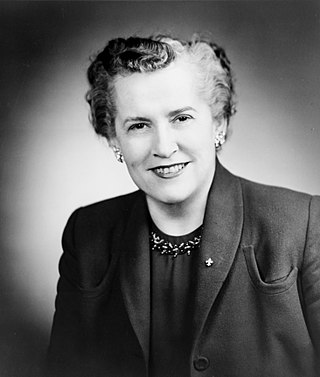Related Research Articles
Education reform is the name given to the goal of changing public education. The meaning and education methods have changed through debates over what content or experiences result in an educated individual or an educated society. Historically, the motivations for reform have not reflected the current needs of society. A consistent theme of reform includes the idea that large systematic changes to educational standards will produce social returns in citizens' health, wealth, and well-being.

The Great Society was a set of domestic programs in the United States launched by President Lyndon B. Johnson in 1964 and 1965. The term was first referenced during a 1964 speech by Johnson at Ohio University, then later formally presented at the University of Michigan, and came to represent his domestic agenda. The main goal was the total elimination of poverty and racial injustice.

The United States Department of Education is a cabinet-level department of the United States government. It began operating on May 4, 1980, having been created after the Department of Health, Education, and Welfare was split into the Department of Education and the Department of Health and Human Services by the Department of Education Organization Act, which President Jimmy Carter signed into law on October 17, 1979.

Title IX is a landmark federal civil rights law in the United States that was enacted as part of the Education Amendments of 1972. It prohibits sex-based discrimination in any school or any other education program that receives funding from the federal government. This is Public Law No. 92‑318, 86 Stat. 235, codified at 20 U.S.C. §§ 1681–1688.

The No Child Left Behind Act of 2001 (NCLB) was a U.S. Act of Congress promoted by the presidency of George W. Bush. It reauthorized the Elementary and Secondary Education Act and included Title I provisions applying to disadvantaged students. It mandated standards-based education reform based on the premise that setting high standards and establishing measurable goals could improve individual outcomes in education. To receive federal school funding, states had to create and give assessments to all students at select grade levels.

Patsy Matsu Mink was an American attorney and politician from the U.S. state of Hawaii. She served in the United States House of Representatives for 24 years as a member of the Democratic Party, initially from 1965 to 1977, and again from 1990 until her death in 2002. She was the first woman of color and the first Asian-American woman elected to Congress, and is known for her work on legislation advancing women's rights and education.

The Elementary and Secondary Education Act (ESEA) was passed by the 89th United States Congress and signed into law by President Lyndon B. Johnson on April 11, 1965. Part of Johnson's "War on Poverty", the act has been one of the most far-reaching pieces of federal legislation affecting education ever passed by the United States Congress, and was further emphasized by the revised No Child Left Behind Act of 2001.

The Civil Rights Restoration Act of 1987, or Grove City Bill, is a United States legislative act that specifies that entities receiving federal funds must comply with civil rights legislation in all of their operations, not just in the program or activity that received the funding. The Act overturned the precedent set by the Supreme Court decision in Grove City College v. Bell, 465 U.S. 555 (1984), which held that only the particular program in an educational institution receiving federal financial assistance was required to comply with the anti-discrimination provisions of Title IX of the Education Amendments of 1972, not the institution as a whole.
A Pell Grant is a subsidy the U.S. federal government provides for students who need it to pay for college. Federal Pell Grants are limited to students with exceptional financial need, who have not earned their first bachelor's degree, or who are enrolled in certain post-baccalaureate programs, through participating institutions. Originally known as a Basic Educational Opportunity Grant, it was renamed in 1980 in honor of Democratic U.S. Senator Claiborne Pell of Rhode Island. A Pell Grant is generally considered the foundation of a student's financial aid package, to which other forms of aid are added. The Federal Pell Grant program is administered by the United States Department of Education, which determines the student's financial need and through it, the student's Pell eligibility. The U.S. Department of Education uses a standard formula to evaluate financial information reported on the Free Application for Federal Student Aid (FAFSA) for determining the student's Expected Family Contribution (EFC).

The Bilingual Education Act (BEA), also known as the Title VII of the Elementary and Secondary Education Amendments of 1967, was the first United States federal legislation that recognized the needs of limited English speaking ability (LESA) students. The BEA was introduced in 1967 by Texas senator Ralph Yarborough and was both approved by the 90th United States Congress and signed by President Lyndon B. Johnson on January 2, 1968. While some states, such as California and Texas, and numerous local school districts around the country already had policies and programs designed to meet the special educational needs of elementary and secondary school students not fluent in the English language, this act signaled that the federal government now also recognized the need for and value of bilingual education programs in U.S. public education. In 1969 there was a 50% drop out rate among Mexican American students who struggled to keep up with their English-speaking peers in school; Representative Tony Abril argued that the Bilingual Education Act would reduce this number. Passed on the heels of the Civil Rights Movement, its purpose was to provide school districts with federal funds, in the form of competitive grants, to establish innovative educational programs for students with limited English speaking ability.
Arlene Horowitz is an American women's activist and the author the Women's Educational Equity Act.
The English Language Acquisition, Language Enhancement, and Academic Achievement Act - formerly known as the Bilingual Education Act - is a federal grant program described in Title III Part A of the federal Elementary and Secondary Education Act (ESEA), which was reauthorized as the No Child Left Behind Act in 2002 and again as the Every Student Succeeds Act in 2015. This section is specifically targeted to benefit Limited English Proficient (LEP) children and immigrant youth. The statute states that LEP students must not only attain English proficiency but simultaneously meet the same academic standards as their English-speaking peers in all content areas. Federal funding is provided to assist State Education Agencies (SEAs) and Local Education Agencies (LEAs) in meeting these requirements. In 2011, ESEA Title III awards were granted to 56 SEAs and the average award given to an individual SEA was $12,158,046.

Edith Louise Starrett Green was an American politician and educator from Oregon. She was the second Oregonian woman to be elected to the U.S. House of Representatives and served a total of ten terms, from 1955 to 1974, as a Democrat.

The Tower Amendment was a 1974 proposed amendment to the United States Securities Exchange Act of 1934, named after Texas Republican Senator John Tower, who introduced it. The Tower Amendment was intended to modify Title IX.
Christine Grant was an American athlete, coach, administrator, and advocate for women's college athletics. Dr. Grant served as the athletic director at the University of Iowa from 1973 until 2000. She was inducted into the University of Iowa Athletics Hall of Fame in 2006. Grant was also inducted into the Women's Basketball Hall of Fame in 2017.
The Federal Charter School Program was created in 1994, as an amendment to the Elementary and Secondary Education Act. The purpose of the program is to provide federal funding to state or local education agencies that manage the development and execution of charter schools within the USA.

Bernice Resnick Sandler was an American women's rights activist. She is best known for being instrumental in the creation of Title IX, a portion of the Education Amendments of 1972, in conjunction with representatives Edith Green and Patsy Mink and Senator Birch Bayh in the 1970s. She has been called "the Godmother of Title IX" by The New York Times. Sandler wrote extensively about sexual and peer harassment towards women on campus, coining the phrase "the chilly campus climate".
The Project on the Status and Education of Women (PSEW) was the first United States project focused on gender equity in education. Formed in 1971 by the Association of American Colleges (AAC), known today as the Association of American Colleges and Universities (AACU), PSEW worked to improve access to and equity within higher education for women, addressing the needs of university students, faculty, staff, and administrators. PSEW produced and distributed materials about the status of women in higher education, advised colleges and universities about policies related to affirmative action, women's studies programs, and hiring women faculty, and worked with policymakers to introduce legislation to improve gender equity in American higher education. PSEW's periodical, On Campus with Women (OCWW), ran from 1971–2013 through the AACU, publishing articles and research related to women in higher education. PSEW also played a significant role in the development and passage of Title IX, the portion of the U.S. Education Amendments of 1972 that prohibits discrimination in education on the basis of sex.
The federal government of the United States has limited authority to act on education, and education policy serves to support the education systems of state and local governments through funding and regulation of elementary, secondary, and post-secondary education. The Department of Education serves as the primary government organization responsible for enacting federal education policy in the United States.

The Education for Economic Security Act is a United States federal education law that was enacted in 1984. It provided funding for programs to support schools and teachers in the instruction of math and science, including grants, awards, and scholarships. The act funded teacher training programs and awarded schools and teachers that excelled in the instruction of math and science. The act also developed a program to combat asbestos in schools, fund magnet schools, and protect students from religious discrimination.
References
- 1 2 Boschert, Sherry (2022-06-22). "The true mother of Title IX. And why it matters now more than ever". Washington Post. ISSN 0190-8286 . Retrieved 2022-06-22.
- 1 2 Ware, Susan. Game, Set, Match: Billie Jean King and the Revolution in Women's Sports. The University of North Carolina Press, 2015.
- ↑ Perkins, Carl Dewey (1974-08-21). "All Info - H.R.69 - 93rd Congress (1973-1974): Elementary and Secondary Education Amendments". www.congress.gov. Retrieved 2022-05-30.
- ↑ Davis, Flora. "Moving the Mountain: The Women's Movement in America Since 1960". New York, Simon & Schuster, 1991, pg. 443.
- ↑ vivhdem. "Reauthorization of the Women's Educational Equity Act (WEEA) of 2001". Online posting. The National Council for Research on Women. 15 July 2010. http://www.ncrw.org/content/womens-educational-equity-act-weea.
- ↑ Online posting. U.S. Department of Education. http://www2.ed.gov/programs/equity/funding.html.
- ↑ Online posting. National Alliance for Partnerships in Equity. http://napequity.org/public-policy/current-laws-and-bills/womens-educational-equity-act.
![]() This article incorporates public domain material from websites or documents of the U.S. Department of Education .
This article incorporates public domain material from websites or documents of the U.S. Department of Education .